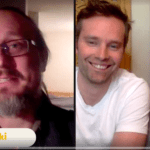
Why We Don’t Listen to Trauma Survivors (the “Contagion” principle)
April 7, 2018
Talking about The Walrus Article on Jois with Colin Hall and Sarah Garden on Bodhi Talks Live
May 1, 2018
What I’m learning from others is that trauma stories can rarely be remembered and told in anything that resembles a linear arc.
The reason for this is that trauma disorganizes the continuity of the self.
Details are broken, and their fragments are retrieved in an unpredictable order.
Therapists have known this forever. They register the verbal evidence of the earthquake: patients stutter, loop back, gap out, break in with non sequiturs, change the subject, and weep.
Imagine trying to pick up the pieces of a smashed mirror. You’ll never be able to do it in the precise order or radius in which they scattered.
You’ll pick up what you can, according to the energy you have. You’ll cut yourself in the process. It will take a long time, and what you put back together will never be complete.
Problem: journalism and the law often cooperate to enforce a general societal demand that disregards this reality of the trauma story.
We ask the trauma survivor who chooses to tell their story to present something like a news story or a legal writ. We want it scrubbed of jagged emotions. We want them to present the mirror of their continuous self as though it had not been smashed.
This demand is so unreasonable, so tone-deaf, that the person trying to pick up those pieces can be easily discouraged, humiliated by the mess that somehow they must make whole again for it to be heard, let alone believed.
We say that we hope the trauma survivor is working this all out in therapy, without realizing that the way in which we listen may be playing a critical role in whether it can be worked out at all.
We don’t understand that our responses can have a direct impact on the accessibility of those memories. A denial or deflection from the listener can easily and shamefully reinforce the very repressions of denial and deflection that the speaker is trying to break through.
Most of us are neither journalists nor lawyers. But we can all be better listeners through this single practice: when you hear the beginnings of a story that sounds like it is conveying trauma, don’t interrupt. Not with questions, contexts, challenges, equivocations, or it-can’t-be-that-bad-isms.
Try to imagine that you’ve started to eavesdrop on someone picking up those shards. You can’t see the shards, and you’d need some professional training to help the person in any explicit sense.
The very least you can do is stay out of their way, and let them know you are listening. A further step would be to indicate you understand how much it costs them to speak at all. It may be hurting them to speak.
If all you can offer is a fraction of the time and space that was stolen away, that’s really something.
____
Note: I am not a trauma specialist or trauma counsellor. I’m I writer who has been interviewing people who have had adverse experiences in yoga culture, in support of the WAWADIA project. For qualified trauma-sensitive support and training in yoga modalities, check out the work of Molly Boeder Harris, Tiffany Rose, and Hala Khouri, to name just a few. Also: although I did not see this (or any similar) article prior to working with the mirror metaphor, I am not the first to use it in this context.